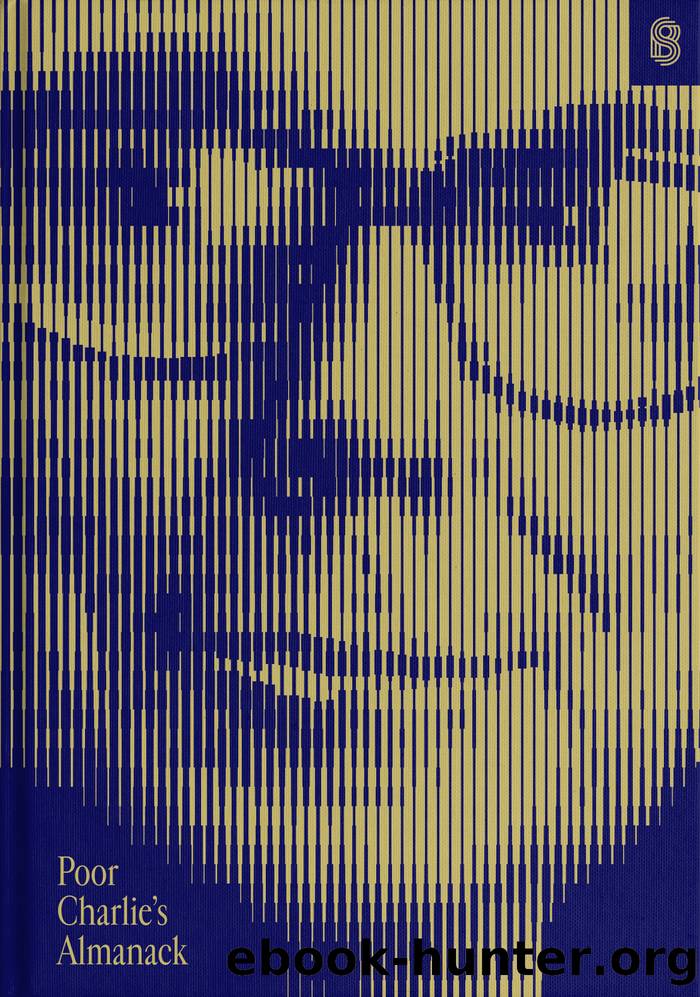Poor Charlie's Almanack by Charles T. Munger

Author:Charles T. Munger
Language: eng
Format: epub
Publisher: Stripe Press
Published: 2023-09-09T00:55:01+00:00
Talk Seven Revisited
This talk in November 2000 turned out to be pretty timely because stock market unpleasantness thereafter greatly increased, particularly for high-tech stocks. But, as nearly as I can tell, there has been absolutely no theoretical reaction from anyone who heard or read the talk. I still believe everything I said about significant macro-economic effects from febezzlement through excessive investment costs. But no one trained in economics has ever tried to engage with me on this subject.
Undeterred by this apathy, I am now going to push my reasoning one notch further by laying out a thought experiment extrapolating the combined reasoning of Talks Six and Seven to an assumed higher level of investment costs.
Assume that 2006 stock prices rise by 200 percent while corporate earnings do not rise, at which point all the sensibly distributable earnings of all US corporations combined amount to less than the total of all stockholder investment costs, because such costs rise proportionally with stock prices.
Now, so long as this situation continues, no money at all, net of investment costs, is going out of all corporations to all corporate owners combined. Instead, frictional cost imposers get more than all sensibly distributable corporate earnings. And at the end of any year, the corporate owners in aggregate can get money by reason of their stockholding only by making stock sales to providers of ânew money,â who, considering high continuing investment costs for themselves and others, must expect that stock prices will keep rising indefinitely while all stock owners, combined, are getting nothing, net, except by selling stock to more new money.
To many imposers of frictional investment costs, this peculiar state of affairs would seem ideal, with more than 100 percent of sensibly distributable corporate earnings going to precisely the right sort of people, instead of being wasted on the shareholders. And some economists would regard the result as good because it came about in a market. But to me it would resemble a weird and disturbing combination of 1) a gambling casino imposing an unreasonably greedy take for the house, plus 2) a form of Ponzi-like scheme, similar to the market for expensive art, in which participation would be unsuitable for pension funds, etc., plus 3) a bubble of speculation that would eventually burst, probably with unfortunate macroeconomic consequences. And what the situation would not look like is a state of affairs likely to function well in guiding the capital development of the surrounding civilization.
Such a state of affairs, or even a lesser version, would, I think, reduce the reputation of our country, and deservedly so.
Download
This site does not store any files on its server. We only index and link to content provided by other sites. Please contact the content providers to delete copyright contents if any and email us, we'll remove relevant links or contents immediately.
| Corporate Finance | Crowdfunding |
| Financial Engineering | Financial Risk Management |
| Wealth Management |
The Black Swan by Nassim Nicholas Taleb(7098)
Bad Blood by John Carreyrou(6608)
Pioneering Portfolio Management by David F. Swensen(6280)
Millionaire: The Philanderer, Gambler, and Duelist Who Invented Modern Finance by Janet Gleeson(4457)
Skin in the Game by Nassim Nicholas Taleb(4232)
The Money Culture by Michael Lewis(4186)
Bullshit Jobs by David Graeber(4177)
Skin in the Game: Hidden Asymmetries in Daily Life by Nassim Nicholas Taleb(3986)
The Wisdom of Finance by Mihir Desai(3726)
Blockchain Basics by Daniel Drescher(3571)
Liar's Poker by Michael Lewis(3439)
Fooled by Randomness: The Hidden Role of Chance in Life and in the Markets by Nassim Nicholas Taleb(3104)
Hands-On Machine Learning for Algorithmic Trading by Stefan Jansen(3065)
The Intelligent Investor by Benjamin Graham Jason Zweig(3034)
Mastering Bitcoin: Programming the Open Blockchain by Andreas M. Antonopoulos(3033)
The Power of Broke by Daymond John(2966)
Investing For Dummies by Eric Tyson(2943)
You Are What You Risk by Michele Wucker(2713)
Market Wizards by Jack D. Schwager(2694)
